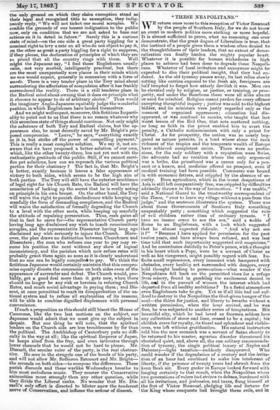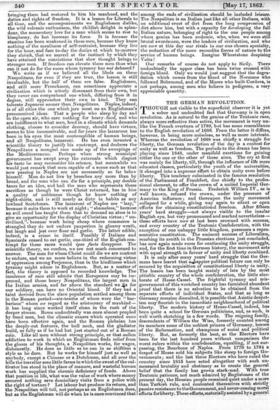" T1=1 - ESE NEAPOLITANS." 11T E return once more to this
reception of Victor Emanuel by the people of Southern Italy, for we do not know an event in modern politics more striking or more hopeful. It is almost sufficient to prove, what no reasoning can ever demonstrate, that the great dogma of Liberalism is true, that the instinct of a people gives them a wisdom often denied to the thoughtfulness of their leaders, that no extent of demo- ralization can finally harden the mighty popular heart. Whatever it is possible for human wickedness is high places to achieve had been done to degrade these Neapoli- tans. Whatever of local irritation and annoyance might be expected to dim their political insight, that they had en- dured. As the old tyranny passes away, its last relics slowly rotting like carrion exposed to the fresh air, foreigners are half tempted to forget how utterly devilish it was. Men can be elevated only by religion, or justice, or training, or pros- perity, and under the Bourbons these were all alike absent or used for mischief. Religion meant pardon for every offence excepting thoughtful inquiry ; justice was sold to the highest bidder, and its ministers were justly regarded only as the meanest of organized oppressors ; education had dis- appeared, or was confined to monks, who taught that last worst lesson of the Evil One, that acts mattered nothing, so long as faith in the priest enabled him to avert the penalty, a Catholic antinomianism with only a priest for Christ. As for prosperity, the nation was as nearly beg- gared as nature permits, in a land where alone the rank richness of the tropics and the temperate wealth of Europe have achieved cempletest union. There were no profes- sions, for the only soldiery with a reputation were Swiss, the advocate had no vocation where the only argument' was a bribe, the priesthood was a career only for a pea- sant or a knave, and medicine offered no prospect, even if' medical training had been possible. Commerce was bound. in with economic fetters, and crippled by the absence of se- curity. Even agriculture, which in the worst despotisms of Asia is still left comparatively free, was crippled by difficulties advisedly thrown in the way of locomotion. " I was unable," said a National Guard to the trustworthy correspondent of the Times, " ever to leave my village without a pass from the judge," and the sentence illustrates the system. There was about these Governments of Southern Italy something unspeakably petty ; something which suggested the rule of evil children rather than of ordinary tyrants. " I have an insane crave to see the sea," said a noble of Rome to an Englishman, with a look which suggested that he almost expected ridicule. " And why not see it F" " Because I have applied for permission for the past twelve years, and have always been refused, and was last time told that such importunity suggested evil suspicions." And he contributes dutifully to Peter's pence, with a thought in his heart which a Pope, were he a servant of Christ as well as his vicegerent, might possibly regard with fear. In- finite small repressions, every innocent wish hampered with obstacles, every healthy act surrounded with dangers, every bold thought leading to persecution—what wonder if the Neapolitans fell back on the permitted vices for a refuge from misery, found in gambling the excitement denied in life, mai in the pursuit of women the interest which had departed from all healthy ambitions ? In a fret-id atmosphere even Eaglishmen take to gin. Yet as if all this had not suf- ficed to destroy in the Neapolitan the God-given hunger of the soul—the thirst for justice, and liberty to breathe without a written permission, when the hour arrived, and he was free, he was subjected to another series of temptations. His beautiful city, which he had loved as freemen seldom love any collection of stone and lime, ceased to be a capital ; his childish crave for royalty, its tinsel and splendour and visible- ness, was left without gratification. His natural instructors told him the new monarch was a servant of Satan shortly to be returned to his master, agrarian disorder threatened his cherished quiet, and, above all, the one solitary recommenda- tion of tyranny, the single political luxury of Naples and Dahomey—light taxation—suddenly disappeared. Who could wonder if the degradation of a century and the irrita- tion of an hour had combined to make him intolerant of liberty, if the prisoner of twenty years had shrunk from the. keen fresh air. Every gaoler in Europe looked forward with longing certainty to that result, when the Neapolitan whom two generations of rulers had striven to debase, burdened with all his irritations, and jealousies, and taxes, flung himself at the feet of Victor Emanuel, pledging life and fortune for the King whose conquests had brought these evils, and in bringing them had restored to him his manhood, and the duties and rights of freedom. It is a lesson for Liberals to all time, and the accompaniments we Englishmen dislike, the wild volcanic enthusiasm, the childish delight in splen- dour, the momentary love for a man which seems to rise to blasphemy, do but increase its force. It is because the stamina has been weakened in these men, because they know nothing of the manliness of self-restraint, because they live for the hour, and face to-day the duties at which to-morrow they shrink, that we marvel at the instinct by which they have attained the convictions that slow thought brings to stronger men. If freedom can elevate these men thus what can it not do for the races whom tyranny has not debased ?
We write as if we believed all the libels on these Neapolitans, for even if they are true, the lesson is still invaluable, but the half of them are false. Englishmen, and still more Frenchmen, can sometimes appreciate a civilization which is utterly dissonant from their own, but they never can comprehend one which, differing from it in degree, still approaches their own in kind. They can tolerate Japanese sooner than Neapolitans. Naples, indeed, is of all cities the one which jars most on an Englishman's preconceived ideas. That a people who sleep by day and in the open air, who care nothing for heavy.food, and who are indifferent to what men, bred in a climate which demands clothing, choose to consider decency, should have virtues, seems to him inconceivable, and for years the lazzarone has been in his eyes the most contemptible of human beings, and all Neapolitans, lazzaroni. He has even invented a scientific theory to justify his contempt, and declares the Neapolitans a mongrel race made up of the sweepings of the Mediterranean. Perhaps when strong municipal government has swept away the externals which disgust his taste lie may reconsider his science, but meanwhile we would just remark that men capable of a scene such as that now passing in Naples are not necessarily so far below himself. Men do not live by breeches any more than by bread, and the man who can die for a principle, pay double taxes for an idea, and hail the man who represents those sacrifices as though he were Christ returned, has in him a quality of nobleness though he know nothing of night-shirts, and is still nearly as dirty in habits as any lowland Scotchman. The lazzaroni of Naples are "lazy," because it suits them to work at night ; "shameless," because an evil creed has taught them that to demand an alms is to give an opportunity for the display of Christian virtue ; " un- civilized,". because work being cheap where commerce is strangled they do not endure pauperism in gloomy wrath, but laugh and jest over flour and garlic. The latter edible, indeed, is a crime in itself. Possibly if Italians and Spaniards ceased to eat garlic, one-third of the English con- tempt for those races would ipso facto disappear. The scientific theory, we confess, we are not much concerned to answer. The man for whom Christ could die we are content to endure, and we no more believe in the redeeming virtue of oppression among Feejeeans, than in the kindliness which tyranny might educe in Englishmen. But, as a matter of fact, the theory is opposed to recorded knowledge. The insolence of race still admits that Europeans may be im- proved, and those heavy Neapolitans, the largest men in the Italian armies, and far above the standard we for our soldiery, can have no Oriental blood. If they had a taint derived from the slave population settled among them in the Roman period—six-tenths of whom were the " bar- barians" whom we regard as the aristocracy of mankind— it has long since worked itself clean in the rush of the deeper stream. Rome undoubtedly was once almost peopled by freed men, but the climatic causes which operated once have been effective again, and the Roman plebeian lute the deeply-cut features, the bull neck, and the gladiator build, as fully as if he had but just started out of a Roman coin. Like all men without strong principle, or that sullen addiction to work in which an Englishman finds relief from the gloom of his thoughts, a Neapolitan works, for wages, dishonestly. He does as little as he can in as shiftless a style as he dare. But he works for himself just as well as anybody, except a Chinese or a Dutchman, and all over the hills the traveller sees little farms in which the sweat of the cul- tivator has stood in the place of manure, and wasteful human work has supplied the chronic deficiency of funds. Above that position in life, what was the value of work where money secured nothing save domiciliary visits from a police with the right of torture ? Let labour but produce its return, and the Neapolitan will toil, not perhaps as an Englishman does, but as the Englishman will do when he is once convinced that among the ends of civilization should be included leisure. The Neapolitan is an Italian just like all other Italians, with an additional crust of dirt from the long compression of dirt above him, but with a capacity for developing the full Italian nature, belonging of right to the one people among whom genius has been endemic, who, when we were still brutal swordsmen, were the leaders of civilization, and who are now at this day our rivals in our one chosen specialty, the reduction of the more recondite forces of nature to the service of human beings. Imagine Wheatstone despising "Volta!
Our remarks of course do not apply to Sicily. There undoubtedly the upper class has been twice crossed with foreign blood. Only we would just suggest that the degra- dation which comes from the blood of the Normans who followed Bohemond, and of the Moors who built Cordova, is not perhaps, among men who believe in pedigrees, a very appreciable quantity.































 Previous page
Previous page